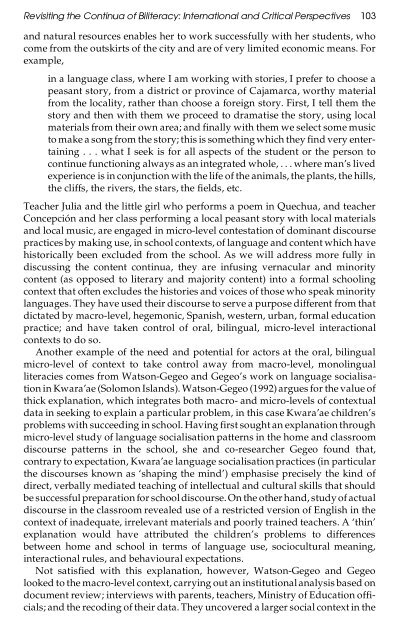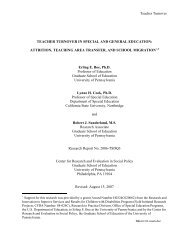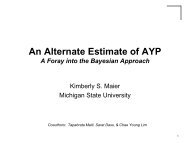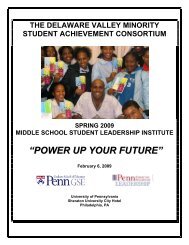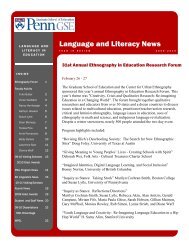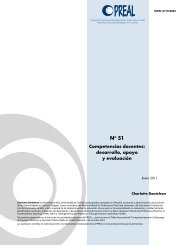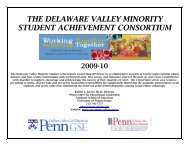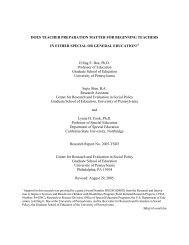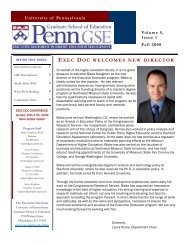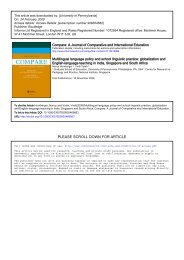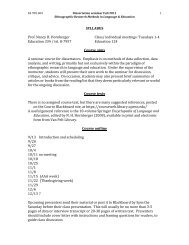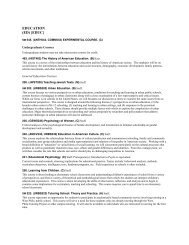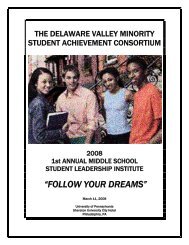Revisiting the Continua of Biliteracy - Penn GSE - University of ...
Revisiting the Continua of Biliteracy - Penn GSE - University of ...
Revisiting the Continua of Biliteracy - Penn GSE - University of ...
You also want an ePaper? Increase the reach of your titles
YUMPU automatically turns print PDFs into web optimized ePapers that Google loves.
<strong>Revisiting</strong> <strong>the</strong> <strong>Continua</strong> <strong>of</strong> <strong>Biliteracy</strong>: International and Critical Perspectives 103<br />
and natural resources enables her to work successfully with her students, who<br />
come from <strong>the</strong> outskirts <strong>of</strong> <strong>the</strong> city and are <strong>of</strong> very limited economic means. For<br />
example,<br />
in a language class, where I am working with stories, I prefer to choose a<br />
peasant story, from a district or province <strong>of</strong> Cajamarca, worthy material<br />
from <strong>the</strong> locality, ra<strong>the</strong>r than choose a foreign story. First, I tell <strong>the</strong>m <strong>the</strong><br />
story and <strong>the</strong>n with <strong>the</strong>m we proceed to dramatise <strong>the</strong> story, using local<br />
materials from <strong>the</strong>ir own area; and finally with <strong>the</strong>m we select some music<br />
to make a song from <strong>the</strong> story; this is something which <strong>the</strong>y find very entertaining<br />
. . . what I seek is for all aspects <strong>of</strong> <strong>the</strong> student or <strong>the</strong> person to<br />
continue functioning always as an integrated whole, . . . where man’s lived<br />
experience is in conjunction with <strong>the</strong> life <strong>of</strong> <strong>the</strong> animals, <strong>the</strong> plants, <strong>the</strong> hills,<br />
<strong>the</strong> cliffs, <strong>the</strong> rivers, <strong>the</strong> stars, <strong>the</strong> fields, etc.<br />
Teacher Julia and <strong>the</strong> little girl who performs a poem in Quechua, and teacher<br />
Concepción and her class performing a local peasant story with local materials<br />
and local music, are engaged in micro-level contestation <strong>of</strong> dominant discourse<br />
practices by making use, in school contexts, <strong>of</strong> language and content which have<br />
historically been excluded from <strong>the</strong> school. As we will address more fully in<br />
discussing <strong>the</strong> content continua, <strong>the</strong>y are infusing vernacular and minority<br />
content (as opposed to literary and majority content) into a formal schooling<br />
context that <strong>of</strong>ten excludes <strong>the</strong> histories and voices <strong>of</strong> those who speak minority<br />
languages. They have used <strong>the</strong>ir discourse to serve a purpose different from that<br />
dictated by macro-level, hegemonic, Spanish, western, urban, formal education<br />
practice; and have taken control <strong>of</strong> oral, bilingual, micro-level interactional<br />
contexts to do so.<br />
Ano<strong>the</strong>r example <strong>of</strong> <strong>the</strong> need and potential for actors at <strong>the</strong> oral, bilingual<br />
micro-level <strong>of</strong> context to take control away from macro-level, monolingual<br />
literacies comes from Watson-Gegeo and Gegeo’s work on language socialisation<br />
in Kwara’ae (Solomon Islands). Watson-Gegeo (1992) argues for <strong>the</strong> value <strong>of</strong><br />
thick explanation, which integrates both macro- and micro-levels <strong>of</strong> contextual<br />
data in seeking to explain a particular problem, in this case Kwara’ae children’s<br />
problems with succeeding in school. Having first sought an explanation through<br />
micro-level study <strong>of</strong> language socialisation patterns in <strong>the</strong> home and classroom<br />
discourse patterns in <strong>the</strong> school, she and co-researcher Gegeo found that,<br />
contrary to expectation, Kwara’ae language socialisation practices (in particular<br />
<strong>the</strong> discourses known as ‘shaping <strong>the</strong> mind’) emphasise precisely <strong>the</strong> kind <strong>of</strong><br />
direct, verbally mediated teaching <strong>of</strong> intellectual and cultural skills that should<br />
be successful preparation for school discourse. On <strong>the</strong> o<strong>the</strong>r hand, study <strong>of</strong> actual<br />
discourse in <strong>the</strong> classroom revealed use <strong>of</strong> a restricted version <strong>of</strong> English in <strong>the</strong><br />
context <strong>of</strong> inadequate, irrelevant materials and poorly trained teachers. A ‘thin’<br />
explanation would have attributed <strong>the</strong> children’s problems to differences<br />
between home and school in terms <strong>of</strong> language use, sociocultural meaning,<br />
interactional rules, and behavioural expectations.<br />
Not satisfied with this explanation, however, Watson-Gegeo and Gegeo<br />
looked to <strong>the</strong> macro-level context, carrying out an institutional analysis based on<br />
document review; interviews with parents, teachers, Ministry <strong>of</strong> Education <strong>of</strong>ficials;<br />
and <strong>the</strong> recoding <strong>of</strong> <strong>the</strong>ir data. They uncovered a larger social context in <strong>the</strong>


